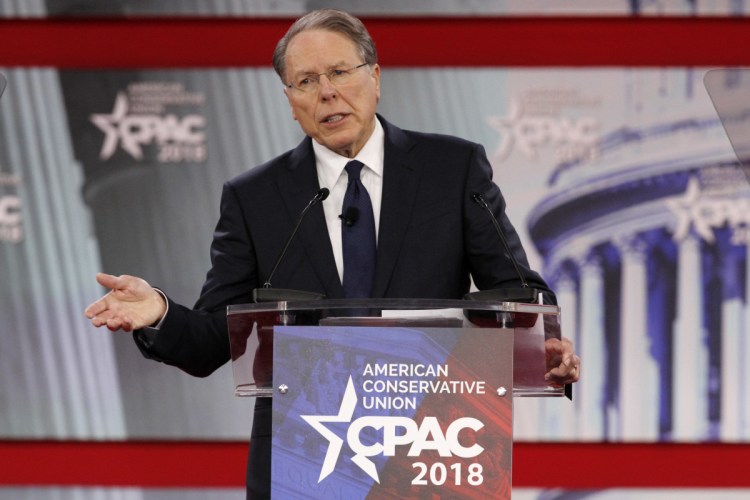After a week of keeping silent following the school shooting in Florida, the National Rifle Association went on the offensive in its first public response to the massacre, pushing back against law enforcement officials, the media, gun-control advocates and the teenage survivors of the massacre who have pleaded for stricter gun laws.
In a series of statements, speeches and videos, the gun rights group – a powerful force in American politics – sought to stem what has been an emotionally charged wave of calls for new gun restrictions since police say a teenager armed with an AR-15 rifle killed 17 people at his former high school. An NRA spokeswoman debated survivors of the attack during a heated town hall Wednesday night, and in a speech Thursday morning, Wayne LaPierre, the NRA chief executive, excoriated the media for its coverage of the shooting.
“They don’t care about our schoolchildren,” LaPierre said near the start of the Conservative Political Action Conference, the largest annual gathering of American conservatives. “They want to make all of us less free.”
The NRA also released an advertisement Thursday morning that said “the mainstream media love mass shootings” and claimed that members of the media benefit from covering mass shootings in an effort “to juice their ratings and push their agenda.”
La Pierre, whose confrontational speeches have become a CPAC tradition, was not included in early versions of the conference’s schedule. But when he arrived to speak, he reiterated his pitch for armed guards at schools and free firearms training of teachers. Then he rattled off businesses and people – from jewelry stores to Hollywood actors – who pay for security, calling for Americans to “harden our schools” in the same way.
“We at the NRA are Americans who continue to mourn, and care, and work every day to contribute real solutions to this practical problem,” he said. “Do we really love our money and our celebrities more than we love our children?”
Shortly before LaPierre spoke, President Trump tweeted a message of support for him and the others working at the NRA as “Great People and Great American Patriots” who he said would “do the right thing.”
Since the massacre at Marjory Stoneman Douglas High School in Parkland, Florida, media coverage has been dominated by the attack’s survivors. Teenagers who hid in closets and ran for their lives quickly responded to the shooting by calling for increased gun control, becoming animated with furious activism unseen after previous mass shootings at schools and other public venues.
The survivors called for new gun restrictions in a rally Wednesday in Tallahassee, the Florida capital; in postings on social media and appearances on news shows; and again Wednesday night at a town hall hosted by CNN and attended by lawmakers and Dana Loesch, an NRA spokeswoman. During her appearance Wednesday night, Loesch sought to focus the discussion on who should be able to obtain firearms, noting the numerous red flags that littered the alleged gunman’s past.
School officials had repeatedly expressed concerns about the alleged shooter, the FBI failed to investigate a warning about him last month, a state social services agency had investigated him, and police had received about 20 calls dealing with him in recent years. Yet none of that would have been enough to stop the alleged shooter, who had no criminal record, from passing background checks and obtaining guns. Loesch, appearing beside Broward County Sheriff Scott Israel at the forum, sharply questioned how law enforcement had handled these warning signs and criticized what she called “flawed” background check systems.
In his own responses to the shooting, Trump also criticized the FBI for its fumbling of the tip. Trump has emphasized the idea of arming some teachers as a way to deter future attacks, an idea that was criticized by some law enforcement officers and the National Education Association, the country’s largest teachers lobby. Trump has frequently responded to mass shootings by suggesting that more law-abiding citizens should be armed, echoing LaPierre’s comment following the massacre of 20 children and six adults at an elementary school in Newtown, Connecticut, in 2012: “The only thing that stops a bad guy with a gun is a good guy with a gun.”
Trump has publicly and privately floated actions that would be at odds with some positions of the NRA – a group that heavily backed him during his campaign for the presidency – including suggesting that the age for purchasing assault rifles be raised from 18 to 21.
The alleged shooter in South Florida had purchased at least 10 guns, all rifles and shotguns, including the AR-15 used in the massacre, according to a law enforcement official familiar with the probe. This official said the shooter was able to purchase them all legally and passed all background checks – but was unable to purchase handguns because he was not yet 21.
However, the NRA has resisted the idea Trump has floated for raising the minimum age for purchasing rifles and shotguns.
“Legislative proposals that prevent law-abiding adults aged 18-20 years old from acquiring rifles and shotguns effectively prohibits them for purchasing any firearm, thus depriving them of their constitutional right to self-protection,” Jennifer Baker, a spokeswoman for the group, said in a statement.
Send questions/comments to the editors.



Comments are no longer available on this story